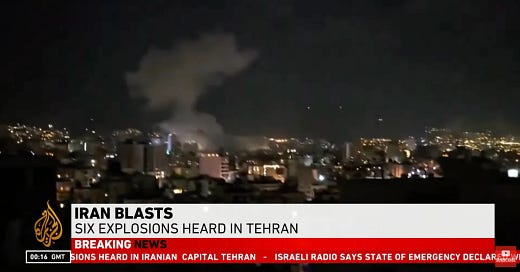KMUN General Assembly Biweekly Edition I- The Abuse of Self-Defense in International Law
Why Israel’s Attack on Iran is Unlawful by Ayaga Max Liambilah
The right of self-defense is one of the most sacred and narrowly-defined exceptions to the international prohibition on the use of force. Rooted in Article 51 of the United Nations Charter, this right permits a state to use force only “if an armed attack occurs” against it. This formulation is unambiguous and has been reinforced by decades of jurisprudence, scholarly interpretation, and customary international law. The plain text of Article 51 is not a license for speculative or preventive wars. It does not allow a state to use force simply because it fears that at some uncertain point in the future, an adversary might attack. And yet, that is precisely the justification increasingly deployed by powerful states to rationalize aggression under the veneer of “anticipatory” or “preemptive” self-defense.
This distortion of the self-defense doctrine has not only diluted the legal limits imposed by the UN Charter but also threatens to return the international order to an era where might makes right. It is within this dangerous context that Israel’s recent aerial attack on Iran must be situated and condemned. This act of aggression has no support under international law, and it underscores an alarming erosion of the prohibition of the use of force. It follows a familiar pattern, reminiscent of the 2003 U.S. invasion of Iraq and Russia’s 2022 invasion of Ukraine, both of which were dressed in the language of preemptive action or self-defense against hypothetical threats.
To assess the legality of Israel’s attack on Iran, one must start with the foundational rule: Article 2(4) of the UN Charter prohibits the threat or use of force against the territorial integrity or political independence of any state. Article 51 carves out an exception, allowing a state to defend itself only when it has been subjected to an armed attack. This threshold is high and demanding. The International Court of Justice (ICJ) in the Nicaragua v. United States case (1986) reaffirmed that the use of force in self-defense must be a response to an actual armed attack. The ICJ clarified that the supply of arms or logistical support, without more, does not amount to an armed attack justifying self-defense.
There is no publicly available evidence that Iran launched or was about to launch an armed attack on Israel at the time of the strike. The justifications offered by Israeli officials are vague references to long-term threats. Israel described the strikes on Natanz, missile factories, and military commanders as “preemptive” self-defense aimed at neutralizing an alleged imminent Iranian nuclear threat. It echoed past justifications, such as Israel’s 1981 Osirak strike on Iraq’s nuclear reactor and Russia’s 1967 pre-emptive strikes in the Six-Day War. preemptive self-defense must meet the stringent Caroline test: the threat must be instant, overwhelming, leaving no choice of means, and no moment for deliberation. Without evidence of direct Iranian involvement in an actual attack, Israel’s actions do not meet the threshold.
The idea of “preemptive” self-defense, often invoked to justify anticipatory strikes, is not a recognized norm in international law. Although some argue that the 1837 Caroline Incident established customary acceptance of anticipatory self-defense, the standard it laid out was exceedingly narrow: there must be “a necessity of self-defense, instant, overwhelming, leaving no choice of means, and no moment for deliberation.” In other words, anticipatory self-defense may be lawful only where an armed attack is imminent and unavoidable. The attack must be necessary and proportionate. Israel’s strike on Iran, in the absence of an imminent threat, fails this test. There is no credible evidence that Iran’s military posed an immediate danger to Israel that left no other means of defusing the situation. The response was neither necessary nor proportionate—it was offensive and preventive.
Some defenders of expansive self-defense argue that the nature of modern threats has evolved. They point to cyberwarfare, terrorism, and rogue states pursuing weapons of mass destruction. But the solution to these complexities is not to discard the Charter's restrictions. The international legal system must adapt through consensus, not unilateral reinterpretation. Allowing powerful states to act on speculative security calculations undermines the collective security framework created in 1945. It empowers the strong to disregard international law under the guise of defending themselves.
The dangers of such precedent are real and immediate. Russia’s 2022 invasion of Ukraine was justified as a preemptive act of self-defense, with claims that Ukraine might join NATO and pose a long-term threat to Russian security. Similarly, in 2003, the U.S. invaded Iraq on the premise that Saddam Hussein possessed weapons of mass destruction and posed a threat to global peace. In both cases, the alleged threats were unproven and the invasions widely condemned. In 2004, then-UN Secretary-General Kofi Annan unequivocally stated that the Iraq War was not in conformity with the UN Charter. The use of force was neither a response to an armed attack nor authorized by the Security Council. It was illegal.
Israel’s latest strike on Iran fits this pattern. It was not authorized by the UN Security Council. It was not in response to a confirmed armed attack. And it was not undertaken as part of a multilateral effort to maintain international peace and security. Rather, it was a unilateral use of force against another sovereign state in peacetime, based on unproven allegations and vague security concerns. That is aggression, plain and simple.
International law is not a flexible tool of convenience. Its strength lies in its universality and restraint. Permitting the doctrine of self-defense to be used as a justification for preventive war weakens the entire legal order. It gives states carte blanche to strike at rivals without evidence of immediate danger. It turns the right of self-defense into a sword rather than a shield.
The UN Charter established a system of collective security precisely to prevent this. Under Chapter VII, the Security Council has the exclusive authority to determine threats to peace and authorize collective action. Unilateral uses of force circumvent this system. If Israel truly believed that Iran posed a threat, the correct path would have been to present evidence before the Council. The refusal to do so indicates the absence of convincing proof and a deliberate decision to act outside the legal framework.
The broader implications are severe. If every state were allowed to strike first whenever it felt threatened, the prohibition of the use of force would become meaningless. Wars would be fought not to repel actual attacks, but to eliminate perceived enemies. The world would return to a Hobbesian state of anarchy, where fear justifies violence and law is replaced by power.
Moreover, the erosion of legal standards enables escalation. Iran now feels justified in retaliating, invoking its own right of self-defense. This could spiral into a broader regional war. The law exists not just to judge past conduct but to prevent future conflict. When the rules are ignored, deterrence fails.
Some may argue that Israel’s security context is unique, and its existential threats justify broader interpretations of self-defense. But international law does not recognize extremist exceptionalism. If law is to have any meaning, it must apply equally. The security of one state cannot come at the price of the legal rights of others. In Legality of the Threat or Use of Nuclear Weapons (1996), the ICJ recognized the right of self-defense but emphasized the need for compliance with the principles of necessity and proportionality. These are not flexible thresholds. They are binding standards.
Israel’s actions also undermine the credibility of the rules-based international order it claims to support. Upholding the rule of law requires consistency. Selective adherence delegitimizes legal arguments made in other contexts. If violations are tolerated for one state, they will be imitated by others. The system cannot survive such hypocrisy.
The way forward is not impunity but accountability. States must reject the misuse of self-defense as a legal cover for aggression. The Security Council must reaffirm the strict limits of Article 51 and resist efforts to rewrite it through state practice. Regional bodies, legal scholars, and civil society must be vocal in defending the Charter. Silence enables erosion.
In conclusion, the recent Israeli attack on Iran cannot be legally justified under the right of self-defense. It lacks any evidence of an imminent armed attack, fails the tests of necessity and proportionality, and was not authorized by the Security Council. It mirrors other unlawful uses of force that have undermined global stability. If such conduct is allowed to stand, the prohibition of the use of force will continue to decay. The world cannot afford this regression. The right of self-defense must remain what it was meant to be—a shield of last resort, not a pretext for war.
Author: Ayaga Max, Contributor to the KMUN Journal – General Assembly Biweekly Edition. Ayaga Max Liambilah is a law student at the University of Nairobi’s Faculty of Law, an active international law and human rights researcher with publications on global governance and sustainable development, and an award-winning contributor in moot court and essay competitions. He is the Chair of the KMUN Journal.
📜 Copyright Notice📜
© 2025 Kenya Model United Nations Journal – General Assembly Biweekly Edition.
All rights reserved. This publication may be shared or cited for non-commercial academic, educational, or research purposes, provided appropriate credit is given to the author. Any other form of reproduction, storage, or transmission, whether electronic, mechanical, or otherwise, requires prior written permission from the author. Authors retain moral rights to their work.
⚖️ Disclaimer⚖️
The views and opinions expressed in this article are solely those of the author and do not necessarily reflect the official position of the Kenya Model United Nations, its chapters, or the editorial board of the KMUN Journal. Responsibility for the content lies entirely with the contributing author.





